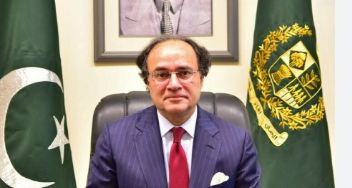LAHORE, Sep 24 (APP): Federal Minister for Finance Muhammad Aurangzeb on Tuesday said that for moving forward it was vital to stay with reform agenda whether it’s from taxation side, energy side, state owned enterprises and privatisation side.
He said this while virtually addressing the High Level Private Sector Dialogue on “Leveraging Private Capital for CPEC II and the Region” at a local hotel.
The dialogue was organized by the recently established Pakistan Regional Economic Forum (PREF) in partnership with Embassy of China.
He said, “In terms of macroeconomic situation where we ended the last fiscal year that trajectory continues into first quarter of this fiscal year.”
Foreign exchange reserves which were now more than two months import cover, inflation had come down, he maintained.
Muhammad Aurangzeb said, “More importantly policy rate is coming down. Few days back the government has rejected all bids aimed at conveying the message that with the grace of Allah Almighty, the government is under no desperation to borrow, and if it has to borrow, it will borrow at its own terms.” Banking sector should start lending to the private sector, he added.
He said that ultimately it was all about foreign direct investment which came into the country.
Regarding International Monetary Fund’s board meeting, Muhammad Aurangzeb said, “We are hopeful that it will approve 37 months programme of dollar 7 billions.” He said, “Under the programme we are committed to do structural reforms.”
He said that Prime Minister Shehbaz Sharif had profusely thanked the government of China in terms of support on fund programme.
He further said that for smooth growth process, stable base was highly important and with the grace of Allah Almighty, Pakistan had reached to a point of good foundation from where it could build up.
He said that China Pakistan Economic Corridor (CPEC) Phase 1 was all about infrastructure and CPEC Phase II was about monetization of that infrastructure.
He said that the incumbent government under the leadership of Prime Minister Shehbaz Sharif was focusing on taking CPEC forward.
He said that bringing in other countries as a partner was also very important and added that the role of private sector could not be ignored at all.
The Federal Minister said, “Government job is to provide policy framework and its continuity and private sector has to lead the country.” He said that private sector leaders must be encouraged, adding that it was all about business to business approach as things move forward.
Development Finance Institutions like Saudi-Pak and Pak-China had fantastic opportunity to step up, he added.
The Finance Minister supported the approach introduced by PREF to promote private sector led regional projects and transactions. He also extended his government’s full commitment to facilitate the adequate private sector financing through multi-lateral and local resources.
The Chinese Ambassador Jiang Zaidong emphasized the need to strengthen confidence in the development prospects of Pakistan.
He said, “We need to strengthen confidence and work hard for development of the country.” He said, “In order to strive for practical results, we must consolidate, deepen and expand China-Pakistan cooperation. Moreover, we need to take the agricultural advantages of neighboring provinces as an example to discuss the agricultural cooperation between China and Pakistan.” He said that Pakistan should offer enhanced mutually beneficial preferential policies for Chinese and regional entrepreneurs.
The Chinese Ambassador said that Pakistan’s energy sector was going through a systemic transition towards gaining more efficiency and price stability.
Earlier, PREF Chairman Haroon Sharif former Chairman in his welcome remarks highlighted the rapid economic transformation of the region and the immense opportunities available in Pakistan for economic development.
With overall theme of making connectivity work for the people, he reiterated that Pakistan’s needed a transition from a debt-to-investment economy, by leveraging infrastructure connectivity, he said and added that this would be done by seeking private sector capital investors from Central Asia, the Gulf and beyond to expeditious implementation of CPEC Phase II.
Khalid Mansoor, former SAPM on CPEC, presented potential projects in the key PREF identified sectors: climate smart agriculture, energy transition, value-added textile, emerging technologies, information technology and trade logistics.
It is pertinent to mention here that the session is followed by an interactive and focused dialogue where all participants shared comments, suggestions and projects which could lead to joint ventures in the region by complimenting each other’s comparative advantage.

















